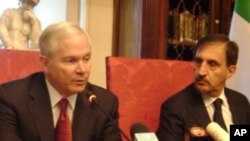U.S. Defense Secretary Robert Gates says there is still time for sanctions and other pressures to convince Iran's leaders to abandon their alleged nuclear weapons program before the West will need to contemplate military action. Gates spoke in Rome, where he met Sunday with Italian Defense Minister Ignazio La Russa.
Secretary Gates was asked about the possibility of military action shortly after Iranian President Mahmoud Ahmadinejad ordered his atomic agency to begin enriching uranium to 20 percent. Iran says the uranium would be used for research, but western officials are concerned because the more highly-enriched uranium could also be used to make a nuclear weapon.
"If the international community will stand together and bring pressure to bear on the Iranian government, I believe there is still time for pressure and sanctions to work," Gates said.
The statement by Iran's president came just a few days after he said he would be willing to send Iran's uranium abroad for enrichment, where its levels and uses can be more closely monitored. That is what the international community has been seeking for months. It was also just one day after his foreign minister said an agreement was near.
President Ahmadinejad's order could add urgency to the move to impose sanctions on his country, but Secretary Gates says they should be carefully structured.
"Pressures that are focused on the government of Iran, as opposed to the people of Iran, potentially have greater opportunity to achieve the objective. We have seen what is going on inside Iran," Gates said. "I think the international community does not want the Iranian people to suffer more hardship than is absolutely necessary."
Secretary Gates' visit to Italy is part of a trip aimed at shoring up relations with allies that are crucial to U.S. efforts in Iraq and Afghanistan.
His meeting with his Italian counterpart touched on Italy's decision to send 1,000 additional troops to Afghanistan, mainly trainers, which the United States says are badly needed for the country's Army and Police. That is the largest single additional commitment since President Barack Obama announced his revised Afghanistan strategy in December, and asked the allies to add 10,000 troops to the 30,000-troop surge the United States is sending. In addition, Italy currently holds command of the NATO effort in western Afghanistan.
The two men also discussed the U.S. decision to provide allies with advanced technology to reduce the effectiveness of roadside bombs, allied operations in Kosovo and issues related to the new fighter jet the United States is developing for itself and other countries, including Italy.
On this trip, Gates also visited Turkey for talks on Kurdish issues, among other things. And he will travel on to France for more talks expected to focus on Afghanistan, Iran and other international security issues.
U.S. Defense Secretary Robert Gates spoke in Rome, where he met Sunday with his Italian counterpart Ignazio La Russa




